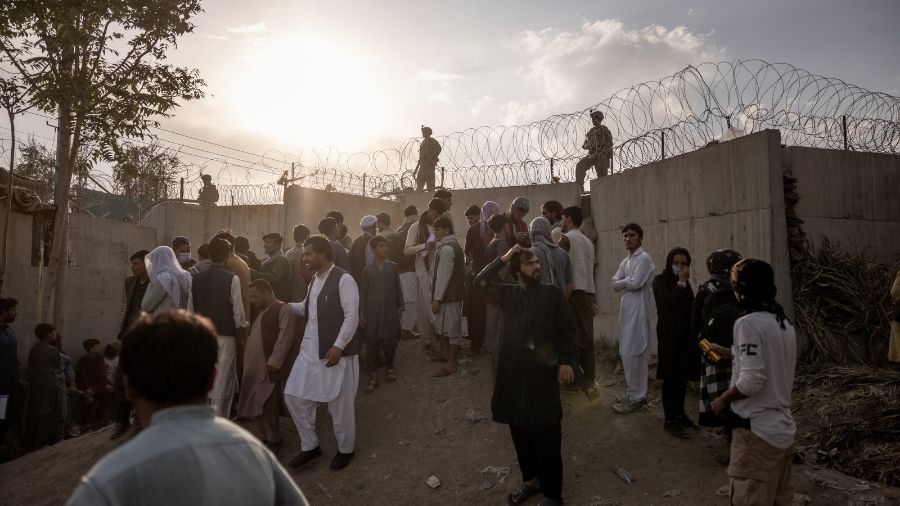A crowd straining to get into Hamid Karzai International Airport had converged on Abbey Gate, a main entryway manned by Marines and other service members. The troops knew that they could be targeted in an attack; just the day before, the State Department had warned of a “credible” threat at three gates at the airport, where more than 5,000 U.S. troops had helped to evacuate more than 100,000 people in less than two weeks. Abbey Gate was on the list.
Airport security had closed two of the gates, but decided to leave Abbey Gate open, U.S. officials said.
They also said that, earlier in the day, Taliban commanders and fighters manning checkpoints along the airport route twice pushed back surging crowds, but they came back again.
That third time, someone else came with them.
At 5:48 p.m., the bomber, wearing a 25-pound explosive vest under clothing, walked up to the group of Americans who were frisking people hoping to enter the complex. He waited, officials said, until just before he was about to be searched by the U.S. troops. And then he detonated the bomb, which was unusually large for a suicide vest, killing himself and igniting an attack that would leave dozens of people dead, including 13 U.S. service members.
“This is close-up war — the breath of the person you are searching is upon you,” Gen. Kenneth F. McKenzie Jr., the head of United States Central Command, said Thursday after the attack, describing the face-to-face contact between Marines at the airport gate and Afghans they must search before allowing them to enter.
Pentagon officials said they were still piecing together the chain of events that took place at Abbey Gate on Thursday. There will be after-action reviews and storyboards with detailed lists of what led up to that moment. There will be questions: Why were so many service members grouped so close together? How did the bomber evade the Taliban checkpoints? Did someone let him through?
U.S. military forces conducted their first reprisal strike in Afghanistan since the attack Friday, “an over-the-horizon counterterrorism operation” in the Nangarhar province “against an ISIS-K planner,” said Capt. Bill Urban, a spokesperson for U.S. Central Command, referring to the Afghan affiliate of the Islamic State group that claimed responsibility for Thursday’s attack.
“Initial indications are that we killed the target,” he said. “We know of no civilian casualties.”
As the scope of the damage from Thursday's bombing became clearer, health officials in Kabul raised the death toll, saying at least 170 people had been killed. Afghans seeking to escape Taliban rule continued to stream to the airport Friday, but the size of the crowd was estimated in the hundreds, down from the thousands who were there when the blast occurred. The airport remained largely locked down, although evacuation flights continued.
Just after 2 p.m. Friday, as another gray-tailed U.S. aircraft lifted into the sky from the airport, this one carrying the flag-draped coffins of the 13 Americans, the anguish from Thursday’s bombing spread from Kabul to Kansas. At the mortuary at Dover Air Force Base in Delaware, service members were bracing for the ritual of dressing and preparing yet another group of U.S. troops killed in Afghanistan.
“I’m never been one for politics and I’m not going to start now,” Marilyn Soviak, the sister of Maxton Soviak, a Navy corpsman from Ohio who was among the dead, posted on Instagram. “What I will say is that my beautiful, intelligent, beat-to-the-sound of his own drum, annoying, charming baby brother was killed yesterday helping to save lives.”
Just after the bomb went off, Defense Department officials said, fighters nearby began firing weapons. The officials said that some of the Americans and Afghans at Abbey Gate might have been hit by that gunfire. There was so much confusion in the aftermath of the explosion that the military initially reported that a second suicide bombing had taken place at nearby Baron Hotel. That turned out to be false, according to Maj. Gen. Hank Taylor, the Joint Staff deputy director for regional operations.
At 25 pounds, the vest worn by the suicide bomber did untold damage. According to Army manuals, suicide bombers typically wear either a belt containing 10 pounds or less of explosives, or a vest packed with 10 to 20 pounds of explosives. With a 25-pound vest that included pieces of metal that acted as lethal shrapnel, the bomber also wounded dozens of Afghans, as well as 14 additional U.S. troops, who were medevaced to Landstuhl Regional Medical Center near the Ramstein Air Base in Germany.
The Marines who were manning Abbey Gate on Thursday had arrived in Kabul about a week earlier. They were fresh, and linked up with their British paratrooper counterparts with one goal in mind: Get as many people through as possible. That meant using an interpreter and a loudspeaker to persuade a surging crowd to move back, a painstaking task that allowed the Marines to open two entry points.
The fall of Kabul had unleashed a tsunami of phone calls, emails and desperate texts from the foreign organizations that had worked in Afghanistan over the past 20 years, all imploring the Pentagon for help getting their Afghan workers and allies evacuated. Other people who worked with Afghans, including teachers who visited schools in Afghanistan, joined American senators, media chiefs and the heads of global organizations in asking for help for their former partners, who are in danger of Taliban reprisals.
The requests reached the U.S. troops at Kabul airport. “The Marines who died were the ones who were helping our team,” said Cori Shepherd, a filmmaker who once helped Afghan girls come to school in the United States. “These men were quite literally going into the masses and pulling our women to safety, while coordinating with our guy to find them. The men who worked Abbey Gate were brave beyond measure.”
(New York Times News Service)










